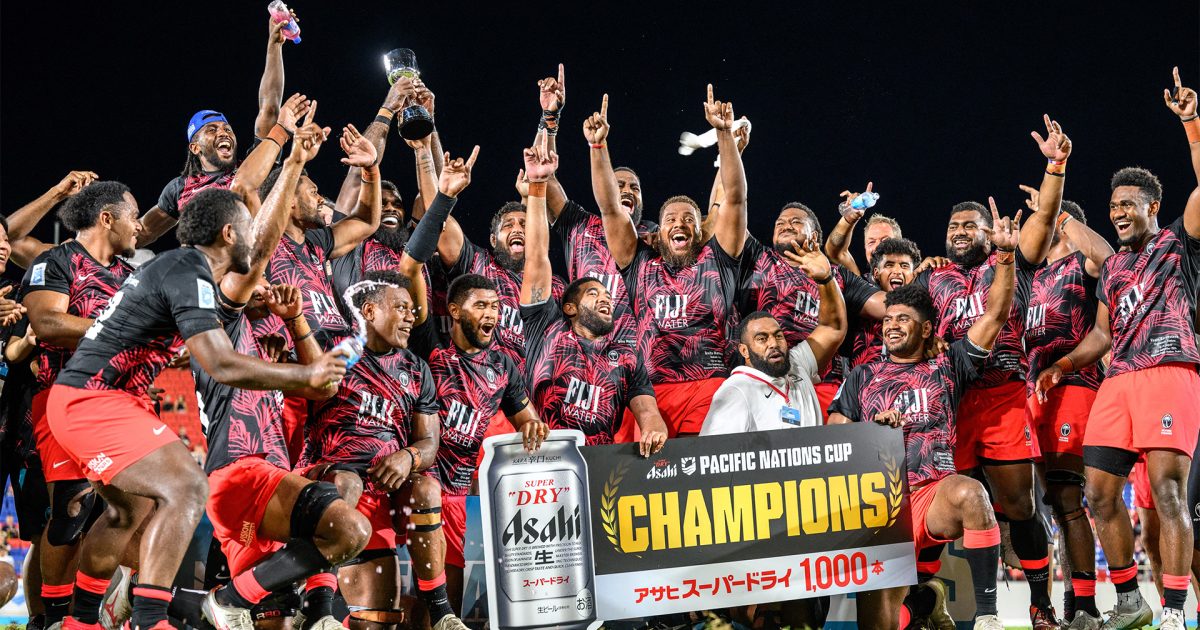Fiji run rampant in final quarter blitz of Japan for Pacific Nations Cup crown

On September 21, the Asahi Super Dry Pacific Nations Cup Final took place at Hanazono Rugby Stadium in Osaka, where the Fiji national team defeated Japan 41- 17, securing their sixth title since 2018.
The match began with a kickoff from Fiji’s fly-half, Caleb Muntz. Fiji was the first to strike. “Japan has been very fast in the first 20 minutes. We tried to contain that with physicality,” said Fiji’s captain, hooker Tevita Ikanivere.
They matched Japan physically and applied pressure, but Japan responded with double tackles. In the 7th minute, Japan opened the scoring with a penalty goal, but Fiji responded quickly in the 9th minute.
The first try went to Japan. In the 20th minute, a scrum near the half-line saw Fiji drop the ball, resulting in a scrum for Japan. From there, centre Dylan Riley feigned a pass, kicked into the open space behind, and scored a try himself. Fullback Seungsin Lee converted the kick successfully, giving Japan a 10-3 lead.
In the 30th minute, Fiji built nine phases in front of Japan’s goal line, and centre Inia Tabuavou placed the ball in the in-goal area, but the TMO ruled a knock-on before the try, resulting in no try.
Over the next few minutes, Japan pressed into Fiji’s territory, but fly-half Harumichi Tatekawa’s kick was intercepted, and Fiji’s wing, Vuate Karawalevu, sprinted from their own half to score, levelling the match at 10-10 at halftime.
While Japan managed to stop Fiji’s attacks in the first half, they found themselves defending more in their own half during the second. In the 5th minute, it appeared Fiji had scored, but the TMO ruled an obstruction, resulting in no try once again.
Japan made early substitutions, with captain fly-half Tatekawa leaving the field and Junta Hamano, making his first cap, entering.
“I wanted to increase the pace of our attack,” Eddie Jones said, explaining the early substitution. Lee switched from fullback to fly-half, but Japan struggled to regain momentum without experienced players.
Fiji took the lead with a penalty goal in the 15th minute, making it 10-13.
In the 59th minute, Fiji maintained an attack through seven phases. Japan, who had been matching Fiji physically, began to slow down. Eventually, with an overload on one side of the field, Ponipate Loganismasi, also a member of the sevens team, scored in the right corner. Muntz converted the kick, breaking the deadlock at 20-10.
Despite the deficit, there was still a strong support presence for Japan in the stands, with spontaneous applause encouraging the team.
Just after, in the 62nd minute, Japan faced a golden scoring opportunity. Having been forced to battle mostly in their own half, a penalty against Fiji allowed Lee to find a nice touch, presenting a prime opportunity near the goal line. However, they failed to catch the throw at the back of the lineout, giving Fiji the chance to launch a 50/22 kick, putting Japan in their corner.
In the 66th minute, Fiji executed a lineout near Japan’s goal and maneuvered around the forwards to score through Albert Tuisue in the left centre. The TMO confirmed the try, followed by a successful goal kick, extending Fiji’s lead to 27-10.
Japan’s lineout error, which led to the 50/22 situation, marked a turning point in the match.
Fiji went on to add two more tries, stretching the score to 41-10, but Japan’s wing, Malo Tuitama, managed to score the team’s second try in the 77th minute, concluding the match at 41-17.
Fiji’s back-row, Meli Derenalagi, was named Player of the Match, while Fiji’s fly-half Caleb Muntz was awarded Player of the Tournament.
Head coach Mick Byrne reflected, “In this tournament, we were able to extend our lead in the second half. It was a great opportunity for young players to experience test matches.”







































